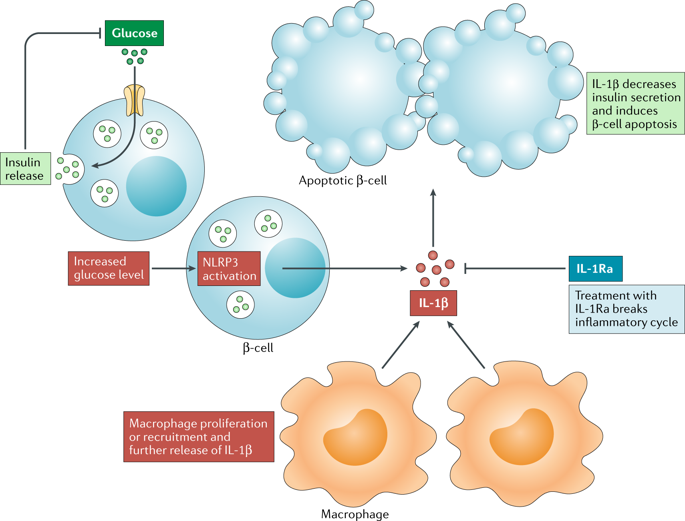Nature Reviews Immunology ( IF 67.7 ) Pub Date : 2019-09-09 , DOI: 10.1038/s41577-019-0213-9
Marc Y Donath 1, 2 , Charles A Dinarello 3 , Thomas Mandrup-Poulsen 4

|
Type 1 and type 2 diabetes are characterized by chronic inflammation; both diseases involve pancreatic islet inflammation, while systemic low-grade inflammation is a feature of obesity and type 2 diabetes. Long-term activation of the innate immune system impairs insulin secretion and action, and inflammation also contributes to macrovascular and microvascular complications of diabetes. However, despite strong preclinical evidence and proof-of-principle clinical trials demonstrating that targeting inflammatory pathways can prevent cardiovascular disease and other complications in patients with diabetes, there are still no approved treatments for diabetes that target innate immune mediators. Here, we review recent advances in our understanding of the inflammatory pathogenesis of type 1 and type 2 diabetes from a translational angle and point out the critical gaps in knowledge that need to be addressed to guide drug development.
中文翻译:

针对 1 型和 2 型糖尿病的先天免疫介质。
1型和2型糖尿病的特点是慢性炎症;这两种疾病都涉及胰岛炎症,而全身性低度炎症是肥胖和 2 型糖尿病的特征。先天免疫系统的长期激活会损害胰岛素的分泌和作用,炎症也会导致糖尿病的大血管和微血管并发症。然而,尽管强有力的临床前证据和原理验证临床试验表明,靶向炎症通路可以预防糖尿病患者的心血管疾病和其他并发症,但仍然没有批准的针对先天免疫介质的糖尿病治疗方法。这里,































 京公网安备 11010802027423号
京公网安备 11010802027423号